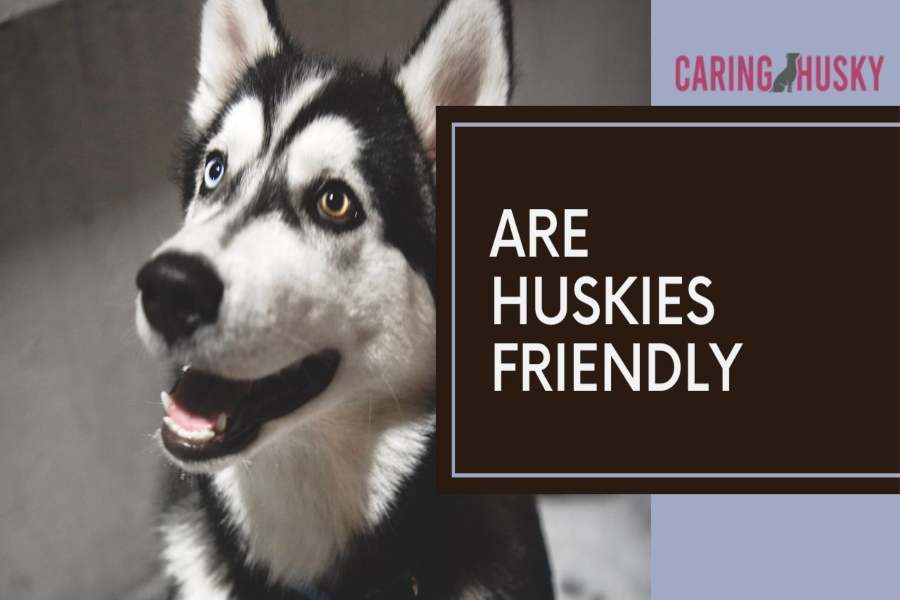Siberian Huskies’ striking appearance and enigmatic personalities have captivated dog enthusiasts for generations. These Arctic dogs, bred for their ability to withstand frigid temperatures and pull heavy sleds across snow-covered landscapes, are undoubtedly one of the most visually appealing canine breeds. Yet, as potential owners consider bringing a Husky into their homes, a common question looms: Are Huskies friendly? In this article, we delve deep into the temperament and behavior of Huskies, separating myths from realities and providing valuable insights into the friendliness of these captivating canines. Understanding the unique qualities of Huskies is essential for anyone considering sharing their life with this breed, and it starts with unraveling the enigma of their temperament.
Are Huskies Friendly?
Yes, Huskies can be friendly, but their temperament can vary. They are known for their independent nature and may not always exhibit the same level of affection as some other breeds. Proper socialization, training, and a loving environment are crucial in shaping their friendliness. With the proper care, Huskies can be loyal, playful, and friendly companions, making them suitable for people prepared to meet their unique needs.
Factors Influencing Huskies’ Friendliness
Several factors can influence the friendliness of Huskies, and it’s essential to consider these variables when assessing their temperament:
- Early Socialization: The foundation of a Husky’s friendliness is laid during its formative weeks. Early socialization is critical, exposing them to different people, animals, environments, and experiences. When a Husky pup interacts positively with a wide range of stimuli, it’s more likely to grow into a well-adjusted and friendly adult dog. Conversely, insufficient socialization can lead to shyness, fear, or aggression.
- Genetics and Breeding Practices: A dog’s genetics play a significant role in determining its temperament. Reputable breeders selectively breed for desirable traits, including temperament. Responsible breeders focus on producing Huskies with good-natured dispositions, increasing the likelihood of friendliness. On the other hand, dogs from less reputable sources may have unpredictable behaviors due to poor breeding practices.
- Individual Differences: Every Husky is a unique individual with its personality. While Huskies as a breed share specific characteristics, such as their independence and intelligence, individual dogs can vary in friendliness. Some Huskies may naturally be more outgoing and friendly, while others may be reserved or aloof. Understanding your specific dog’s personality is crucial for practical training and forming a solid bond.
- Owner’s Role: The owner’s influence shapes a Husky’s temperament. The training methods used, the consistency in care and expectations, and the level of love and respect shown by the owner all contribute to the dog’s friendliness. Positive reinforcement training techniques, where desired behaviors are rewarded, are particularly effective in encouraging a friendly demeanor.
- Early Experiences: Traumatic or damaging early life experiences can leave lasting emotional scars on a Husky. Dogs that have been mistreated, neglected, or exposed to traumatic events may exhibit fearful or aggressive behaviors. Rescued Huskies, in particular, may require extra patience, understanding, and rehabilitation to build trust and become more friendly.
- Health and Well-being: A Husky’s physical and overall well-being can significantly impact its behavior. Regular exercise, mental stimulation, and a balanced diet contribute to a dog’s contentment and friendliness. Conversely, a lack of physical activity or untreated health issues can lead to restlessness and undesirable behaviors.
- Training and Obedience: Huskies are intelligent dogs that thrive on mental stimulation. Engaging in regular training sessions, teaching commands, and providing opportunities for problem-solving can improve their behavior and overall friendliness. Consistency in training and setting clear boundaries helps Huskies understand what is expected of them.
- Pack Mentality: Huskies have a strong pack mentality and thrive on social interaction. They are known to be friendlier when they feel part of a family or pack. Engaging in activities with your Husky, such as group hikes or playdates with other dogs, can satisfy their socialization needs and strengthen their bond with their human family.
In conclusion, Huskies are complex dogs with unique personalities. While they are known for their independent streak, their friendliness is influenced by genetics, early experiences, socialization, responsible ownership, and overall well-being. You can nurture a friendly and well-adjusted Husky companion by carefully considering these factors and providing a loving, stimulating environment.
Signs Of A Friendly Husky
Recognizing the signs of a friendly Husky is essential for understanding and appreciating their affectionate and social nature. Here are some common indicators that a Husky is friendly:
- Playful Behavior: Friendly Huskies are known for their playful nature. They enjoy games of fetch, tug-of-war, and interactive play with their owners. When they initiate play by bringing you toys or engaging in playful antics, it shows their friendliness and eagerness to bond.
- Wagging Tail: A wagging tail is a universal happy and friendly dog symbol. When a Husky greets you with a wagging tail, it signifies their excitement, happiness, and cheerful disposition. The intensity of the tail wag can vary, but a wagging tail generally indicates a friendly and welcoming attitude.
- Eager Social Interaction: Friendly Huskies are typically sociable dogs. They eagerly approach familiar and strange people with curiosity rather than fear or aggression. They may offer a friendly sniff or nudge to initiate contact and establish rapport.
- Affectionate Gestures: Huskies express affection in their unique ways. Some may nuzzle your face, while others may shower you with gentle licks. They might lean against you for comfort or cuddle, demonstrating affection and warmth.
- Relaxed Body Language: A friendly Husky displays relaxed body language. Their posture is typically loose and wiggly rather than tense or defensive. Their ears are often neutral or forward, and their eyes are soft and expressive, reflecting their comfort and friendliness.
- Tolerance of Touch: Friendly Huskies are generally more tolerant of physical contact. They don’t shy away from being petted and may even enjoy belly rubs or scratches behind the ears. Their willingness to be touched is a clear sign of their friendly disposition.
- Well-Behaved Around Other Animals: A friendly Husky gets along well with other animals, including dogs and household pets. They may engage in friendly play, share toys, and show no signs of aggression or dominance. Their ability to coexist harmoniously with other animals is a testament to their friendly nature.
- Happy Vocalization: Some Huskies express their friendliness through vocalization. They may “talk” to you with their characteristic howls, yips, or other cheerful noises. These vocalizations often signify their excitement or happiness to see you.
- Responsive to Commands: A friendly Husky is typically responsive to commands and training. They are eager to please their owners and will follow commands such as “sit,” “stay,” or “come” willingly. Their responsiveness reflects their cooperative and friendly attitude.
- Loyalty and Attachment: Friendly Huskies often form strong bonds with their human family members. They may display loyalty by following you around the house and showing a strong desire to be near you. Their attachment is a testament to their friendly and affectionate nature.
- Contentment at Home: When a Husky feels comfortable and secure in their home environment, they are likelier to exhibit friendly behavior. They may relax, lie down, and feel content, knowing they are in a safe and loving space.
It’s important to note that while these signs indicate a friendly Husky, individual differences can exist within the breed, and some Huskies may be more reserved or cautious by nature. Proper socialization, positive reinforcement training, and a loving environment play a significant role in bringing out the friendliest traits in your Husky and nurturing a strong bond between you and your canine companion.
Tips For Raising A Friendly Husky
Raising a friendly Husky requires dedication, an understanding the breed’s unique traits, and consistent training and care. Here are some tips to help you raise a friendly and well-adjusted Husky:
Early Socialization: Begin socializing your Husky puppy when you bring them home. This is a crucial foundation for their future friendliness. Expose them to various people, animals, environments, and experiences. Consider enrolling in a puppy socialization class where they can interact with other dogs and people in a controlled and positive setting. Early socialization helps your Husky become more confident, adaptable, and less prone to fear or aggression.
Positive Reinforcement Training: Positive reinforcement is highly effective with Huskies. Use treats, praise, and toys as rewards to reinforce desired behaviors. Consistency in your training methods is essential. Short training sessions are often more effective than long, sporadic ones.
Patience and Consistency: Huskies can be independent and occasionally stubborn, but patience and consistency in your training efforts will pay off. These dogs are intelligent and thrive when they understand what’s expected of them. Always use positive reinforcement techniques and avoid punishment-based methods, which can erode trust and lead to fearful or defensive behaviors.
Mental and Physical Stimulation: Huskies have high energy levels and a keen intellect. Engage their minds with puzzle toys, obedience training, and interactive games. Regular exercise is equally crucial. Long walks, hikes, runs, and dog sports like agility or obedience can help burn off excess energy and reduce the likelihood of destructive or unfriendly behavior.
Create a Loving Environment: Huskies are affectionate dogs that often form strong bonds with their families. Spend quality time with your Husky, interact positively, and offer physical affection like cuddles and belly rubs. An environment built on trust, love, and security encourages friendliness.
Teach Bite Inhibition: Start teaching bite inhibition early. Huskies have solid jaws and must learn to control their biting force. Encourage gentle play and discourage rough biting. If your puppy bites too hard during play, let out a yelp or say “ouch” to signal that the bite was too rough. This mimics the way puppies communicate with each other.
Socialize with Other Dogs and People: Regularly expose your Husky to other dogs and people in favorable settings. Playdates with well-behaved dogs and interactions with various individuals help your Husky learn appropriate social cues, play behaviors, and friendly interactions.
Exposure to Various Environments: Take your Husky on outings to different environments, such as parks, beaches, and urban settings. Gradually introduce them to new experiences, building their confidence and reducing fear of the unknown. The more exposure they have, the more adaptable and friendly they’ll become.
Be Consistent with Rules: Establish clear rules and boundaries within your household. Ensure everyone in the family is on the same page regarding what’s allowed, whether furniture, feeding times, or interactions with visitors. Consistency helps prevent confusion and reinforces expected behavior.
Seek Professional Guidance: If you encounter persistent behavior issues or challenges you’re unsure how to address, consider consulting a professional dog trainer or behaviorist, especially one with experience working with Huskies. They can provide expert guidance tailored to your situation and help you overcome obstacles.
Remember that raising a friendly Husky is a lifelong commitment. By incorporating these tips into your daily routine and showing patience and consistency, you can nurture a strong bond with your Husky and help them become a friendly and well-rounded canine companion.
Bottom Line
While Siberian Huskies may possess some independent and aloof traits, they are generally friendly and affectionate dogs when properly raised, socialized, and trained. The key to a harmonious relationship with a Husky lies in responsible ownership, early socialization, positive reinforcement training, and providing them with the mental and physical stimulation they crave. When these aspects are addressed, Huskies can be friendly, loyal, playful, and loving companions, making them a rewarding choice for the right owner willing to invest time and effort into their care.







Leave a Reply